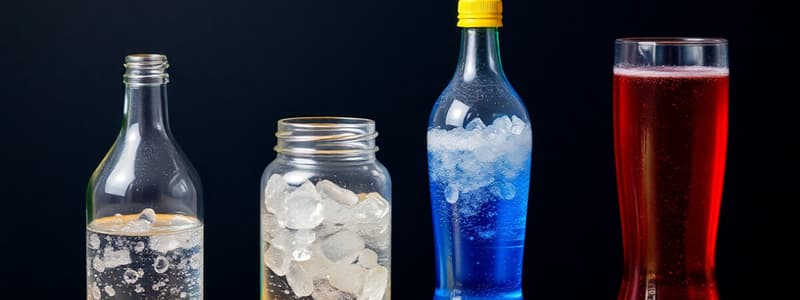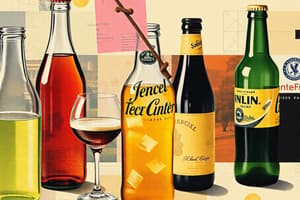Podcast
Questions and Answers
When did the era of cold drinks begin in India?
When did the era of cold drinks begin in India?
1952
Which scientist first discovered a method to infuse water with carbon dioxide?
Which scientist first discovered a method to infuse water with carbon dioxide?
Joseph Priestley
What is the major and defining component of most soft drinks?
What is the major and defining component of most soft drinks?
- Sugar
- Alcohol
- Carbon dioxide (correct)
- Flavoring extracts
What was the name of the apparatus invented by Bergman that allowed imitation mineral water to be produced in large amounts?
What was the name of the apparatus invented by Bergman that allowed imitation mineral water to be produced in large amounts?
Who was the first to sell artificial mineral water to the general public for medicinal purposes?
Who was the first to sell artificial mineral water to the general public for medicinal purposes?
What process did Johann Jacob Schweppe develop to manufacture bottled carbonated mineral water?
What process did Johann Jacob Schweppe develop to manufacture bottled carbonated mineral water?
What is the formula of glucose?
What is the formula of glucose?
What is the molecular formula of sucrose?
What is the molecular formula of sucrose?
What is the main source of sucrose?
What is the main source of sucrose?
Cold drinks are generally acidic in nature due to the presence of citric acid and phosphoric acid.
Cold drinks are generally acidic in nature due to the presence of citric acid and phosphoric acid.
How can the acidity of cold drinks be measured?
How can the acidity of cold drinks be measured?
What is the name of the experiment that detects the presence of glucose in cold drinks?
What is the name of the experiment that detects the presence of glucose in cold drinks?
What is the name of the experiment that detects the presence of phosphate in cold drinks?
What is the name of the experiment that detects the presence of phosphate in cold drinks?
Among the four brands tested (Coca Cola, Sprite, Limca, and Fanta), which one was found to be the most acidic?
Among the four brands tested (Coca Cola, Sprite, Limca, and Fanta), which one was found to be the most acidic?
All the soft drinks tested contained glucose, alcohol, sucrose, phosphate, and carbon dioxide.
All the soft drinks tested contained glucose, alcohol, sucrose, phosphate, and carbon dioxide.
Which of the following is a method used to produce soft drinks at home?
Which of the following is a method used to produce soft drinks at home?
What is the name of the U.S. drink mix that is commonly mentioned in the text?
What is the name of the U.S. drink mix that is commonly mentioned in the text?
What is the source of the food-grade carbon dioxide used for carbonating drinks?
What is the source of the food-grade carbon dioxide used for carbonating drinks?
What is the pH of phosphoric acid?
What is the pH of phosphoric acid?
Soft drinks can dissolve a nail in about 4 days.
Soft drinks can dissolve a nail in about 4 days.
Soft drinks can be used as toilet cleaners.
Soft drinks can be used as toilet cleaners.
Soft drinks can remove rust spots from chrome car bumpers.
Soft drinks can remove rust spots from chrome car bumpers.
Soft drinks can be used as a detergent to remove grease from clothes.
Soft drinks can be used as a detergent to remove grease from clothes.
Soft drinks can loosen a rusted bolt.
Soft drinks can loosen a rusted bolt.
Flashcards
Carbonation
Carbonation
The process of infusing water with carbon dioxide gas, resulting in a bubbly and refreshing beverage.
Carbohydrate
Carbohydrate
A naturally occurring organic compound, responsible for providing our bodies with energy. Examples include glucose, fructose, and sucrose.
Glucose
Glucose
A simple sugar with the formula C₆H₁₂O₆, found in grapes, fruits, and human blood.
Sucrose
Sucrose
Signup and view all the flashcards
Carbonic Acid
Carbonic Acid
Signup and view all the flashcards
pH
pH
Signup and view all the flashcards
Citric Acid
Citric Acid
Signup and view all the flashcards
Phosphoric Acid
Phosphoric Acid
Signup and view all the flashcards
Carbon Dioxide
Carbon Dioxide
Signup and view all the flashcards
Benzoate
Benzoate
Signup and view all the flashcards
Benedict's Reagent Test
Benedict's Reagent Test
Signup and view all the flashcards
Fehling's Solution Test
Fehling's Solution Test
Signup and view all the flashcards
Ammonium Molybdate Test
Ammonium Molybdate Test
Signup and view all the flashcards
Obesity
Obesity
Signup and view all the flashcards
Dental Decay
Dental Decay
Signup and view all the flashcards
Bone Loss
Bone Loss
Signup and view all the flashcards
Benzene
Benzene
Signup and view all the flashcards
Kidney Stones
Kidney Stones
Signup and view all the flashcards
Lacto-fermentation
Lacto-fermentation
Signup and view all the flashcards
Sodium Benzoate
Sodium Benzoate
Signup and view all the flashcards
Fructose
Fructose
Signup and view all the flashcards
Polydipsia
Polydipsia
Signup and view all the flashcards
Evaporation
Evaporation
Signup and view all the flashcards
Solvent
Solvent
Signup and view all the flashcards
Solute
Solute
Signup and view all the flashcards
Sugar
Sugar
Signup and view all the flashcards
Acidic Solution
Acidic Solution
Signup and view all the flashcards
Diabetes
Diabetes
Signup and view all the flashcards
Ascorbic Acid
Ascorbic Acid
Signup and view all the flashcards
Erythorbic Acid
Erythorbic Acid
Signup and view all the flashcards
Study Notes
Investigatory Project: Chemistry
- Project Title: Investigatory Project Chemistry
- Student Name: Pooja Chaudhari
- Class: 12th
Index
- History
- Theory
- Apparatus and Chemicals Required
- Tests and Detections
- Results
- Health Concerns
History
- The era of cold drinks in India began in 1952, marked by companies like Limca and Goldspot.
- Several multinational companies introduced brands like Pepsi and Coke.
- In the 1700s, important steps were made in replicating naturally carbonated mineral water.
- Joseph Priestley discovered a method to carbonate water, and this became a key component in soft drinks.
- John Mervin Nooth and Torbern Bergman further improved the process for commercial manufacturing.
- Jöns Jacob Berzelius added flavors like spices, juices, and wine to carbonated water.
- Thomas Henry sold artificial mineral water for medicinal purposes.
- Johann Jacob Schweppe developed a process to bottle carbonated water and founded the Schweppes Company.
Theory
- Cold drinks contain alcohol, carbohydrates, carbon dioxide, phosphate, etc.
- They create a sense of warmth and lightness
- Carbon dioxide causes froth when shaken.
- Carbonated water forms carbonic acid giving a tangy taste.
- Carbohydrates are essential energy sources.
- Carbohydrates are classified as monosaccharides, disaccharides, and polysaccharides.
- Glucose, a monosaccharide, is found naturally in fruits and blood; sucrose is a common disaccharide.
Apparatus and Chemicals Required
- Provided a list of equipment and chemicals used in the experiments.
Tests and Detections
- pH Detection: Different cold drink samples were tested using pH paper to determine their pH values.
- Carbon Dioxide Detection: Samples were passed through lime water to test the presence of carbon dioxide
- Glucose Detection: Benedict's reagent test was used to identify the presence of glucose.
- Phosphate Detection: Samples were tested with ammonium molybdate and nitric acid to identify phosphate ions
- Sucrose Detection: Samples were heated in china dishes; black residue indicated sucrose.
Results
- Coca Cola, Sprite, Limca, and Fanta were the brands tested.
- Coca Cola was found to be the most acidic, whereas Limca was the least acidic.
- All the drinks contained glucose, alcohol, sucrose, phosphate, and carbon dioxide.
Health Concerns
- Discusses the relationship between sugar-sweetened beverages and obesity and also potential health risks, like dental decay, bone density issues, and the presence of Benzene.
- Mentions a concern about Benzene levels in selected cold drinks based on UK and US surveys.
- Mentions the concern about the negative impact that these drinks have on health.
Uses (page 16)
- Cold drinks have multiple unanticipated uses, including cleaning tools (i.e. chrome bumpers of cars) and acting a detergent.
Studying That Suits You
Use AI to generate personalized quizzes and flashcards to suit your learning preferences.
Related Documents
Description
Explore the fascinating evolution of soft drinks and the chemistry behind carbonation in this investigatory project. From the historical innovations of the 1700s to modern applications in the beverage industry, this project covers essential theories, apparatus, and health concerns associated with carbonated drinks.




